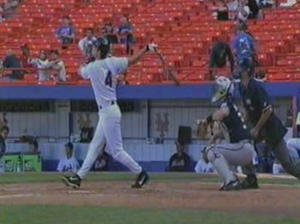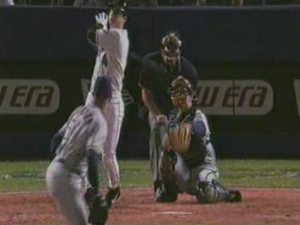Click here for an intro/manifesto on The 1999 Project.
 May 24, 1999: Pirates 7, Mets 4
May 24, 1999: Pirates 7, Mets 4
Thanks to the general ineffectiveness of their starting rotation, the Mets front office debated bringing Jason Isringhausen all season. The member of the ill-fated Generation K missed all of 1998 thanks to elbow surgery, and had appeared in only 33 games since a promising rookie campaign in 1995. Bobby Jones’ trip to the DL (despite Jones’ protests) forced the team’s hand, and he was called up from triple-A Norfolk in time to start the series opener in Pittsburgh.
Izzy showed flashes of the stuff that made him a first-round pick, striking out seven in six innings of work. But his first pitch was tagged for a double, and Jason Kendall clubbed a three-run homer shortly thereafter. The righty would give up another homer and five runs overall. Bobby Valentine called his outing “encouraging,” but it didn’t translate into a win.
The Mets’ offense pulled within one, but Turk Wendell gave up a two-run homer to Ed Sprague that put the game out of reach. They got the tying runs on base in the eighth and ninth innings, but couldn’t get break through against the Pittsburgh bullpen.
May 25, 1999: Mets 8, Pirates 3
Masato Yoshii turned in yet another quality outing–not an overpowering one, but more than effective. The Pirates got the leadoff man on in five of the seven innings Yoshii started, yet were only able to scratch out two runs against him. He gave up a leadoff homer to Al Martin and settled in thereafter, striking out six and inducing two key double plays in 6 2/3 innings of work.
Offensively, the Mets were kickstarted by a 442-foot solo bomb by Mike Piazza off of future battery mate Kris Benson. A few batters later, Brian McRae hit a three run shot, which was all the offense they would need, although they added four more runs against the Pirates’ relief corps.
May 26, 1999: Mets 5, Pirates 2
Orel Hershiser pitched six strong innings to earn the win and helped his cause with a pair of hits. Benny Agbayani knocked the fourth home run of his brief major league career, and John Olerud hit a key two-run single in the top of the ninth to plate some insurance runs.
However, all the post-game talk centered around the Mets’ injury woes. Al Leiter was suffering from a sprained knee, and following an unpromising BP session, Bobby Valentine opted to push back his next start by at least one game. To make matters worse, Isringhausen experienced elbow pain during a throwing session, which jeopardized the likelihood of him making his next scheduled start.
Bobby Bonilla was eligible to return from the DL but refused to take a rehab start in the minors. Instead, he wanted the Mets to fly farm team pitchers into New York for him to face, as they had done with Mike Piazza. (Such a team-first attitude is what made Bonilla a favorite among Mets fans everywhere.)
Unfortunately, the Mets’ troubles were only beginning.



